Eating oatmeal with a sprinkling of chia seeds may just give you the strength to get through the day – after all, the word chia is Mayan for strength! Not only are chia seeds high up on the list of ‘superfoods’ they are also very versatile, whether you want to mix them into a superfood smoothie or just sprinkle them on your food.
In this article we take a look at why chia seeds are considered a superfood and some of the scientific evidence for their potential benefits to our health. We also look at some of the safety concerns around chia seeds and which groups should avoid consuming them. Additionally, to assist you in selecting your next, or even your first purchase of chia seeds, we also review ten of the best chia seeds currently available.Quick Comparison: Top 10 Best Chia Seeds
1. Healthworks Chia Seeds
The Healthworks chia seeds are sourced from small farms where the seeds are grown and harvested sustainably. Although not currently certified organic, these are grown naturally and without the use of pesticides. This bulk 6 lb. bag of raw chia seeds are produced in Mexico or South America and come with a 30 day 100% satisfaction or your money back guarantee.
Some buyers have found these seeds can contain more brown seeds than they would have expected, and these chia seeds may not always absorb liquid as well as others. There is also a risk of the packaging being damaged on arrival.Pros
Cons
2. Viva Naturals Organic Chia Seeds
The USDA certified organic Viva Naturals organic chia seeds are sustainably sourced from non-GMO plants and from farmers who comply with fair trade practices. These raw seeds are harvested in Mexico, Argentina or Paraguay and come in a 2 lb. resealable bag. Like any natural product, there can be a risk of some minor contamination of small stones or other debris and there can be a chance of the bag being damaged during shipping.
Pros
Cons
3. Nutiva Organic Black Chia Seeds
Sourced from organic farms and Non-GMO Project Verified, the Nutiva organic black chia seed is also tested above organic standards to assure its quality. This 2 lb. of raw chia seeds come in a resealable pack which is free from any BPA. One percent of the sales of these chia seeds also goes to sustainable agriculture. There can be a risk of contamination, such as from grass seeds, and the package can also be damaged. You may also find more white chia seeds than expected in a bag of black.
Pros
Cons
4. Navitas Organics Chia Seeds
The Non-GMO Project Verified and USDA organic Navitas Organics chia seeds are also certified kosher and from a Certified B Corporation. This 16 oz bag of raw chia seeds is sourced from Mexico, Paraguay and/or Argentina. Some recent buyers have found these seeds have had a slight moldy smell and or taste to them and although these do have a long shelf date, the ‘best by’ date can be short.
Pros
Cons
5. Healthworks Organic Chia Seeds
The raw Healthworks organic chia seeds come as a 3 lb. bag and are sourced from small and sustainable organic farms in Mexico and South America. These seeds are also non-GMO. Some buyers have struggled to get these seeds to absorb liquid and there can be a risk of them arriving in damaged packaging. There can also be some issues around quality control in that not all debris and contaminants have been removed from the seeds.
Pros
Cons
6. BetterBody Foods Organic Chia Seeds
The 2 lb. BPA-free jar of raw BetterBody Foods organic chia seeds are also certified as gluten free, kosher and free from any GMO ingredients. Like other chia seeds, there is a risk of contamination by twigs, other small debris and some insect matter in these seeds. These seeds have been sourced from a range of countries including Mexico, Paraguay, Argentina, Peru and/or Bolivia.
Pros
Cons
7. Terrasoul Superfoods Organic Black Chia Seeds
The Terrasoul Superfoods organic black chia seeds are also certified Earth Kosher, RAW and Non-GMO Project Verified. Sourced from the growers in either South America or Mexico, these raw seeds are sorted using optical laser equipment to remove any debris.
This 2.5 lb. bag of seeds also comes with a satisfaction or money back guarantee. Although buyers seem to have fewer issues with debris in these seeds, there can still be the odd small contaminant.Pros
Cons
8. Kiva Organic Chia Seeds
The raw Kiva organic chia seeds have been triple cleaned and low temperature processed to preserve their flavor. This 1 lb. bag of chia seeds sourced from Argentina are certified USDA organic. They are also Fair Trade, RAW and non-GMO. These can still contain debris and there can be a risk of some seeds smelling and tasting moldy.
Pros
Cons
9. Anthony’s Organic Black Chia Seeds
Certified as USDA organic and batch tested and verified as being gluten free, Anthony’s organic black chia seeds are also GMO-free. The 2.5 lb. of raw chia seeds come in a resealable pack although the packaging may be less robust than expected. Harvested in Latin America, these chia seeds can also contain sand or small pebbles.
Pros
Cons
10. TruVibe Organic Raw Chia Seeds
Sourced directly from small Mexican and Argentinian farms, the TruVibe organic chia seeds are certified USDA organic. This bag of 16 oz raw seeds is resealable after opening to maintain freshness. Unlike other chia seeds, this does carry a Prop 65 warning although these are organic seeds which are not treated with pesticides or other chemicals. These also come with a 30 day satisfaction guarantee.
Pros
Cons
Things to Consider Before Buying Chia Seeds
Chia seeds are able to expand by as much as 27 times their dry weight when they are placed into liquid. Once they have absorbed liquid, they resemble miniature tapioca balls!
Chia seeds are naturally vegan and free from gluten, although if you do have a gluten allergy you should look for seeds certified as gluten free as otherwise they could have been processed in a facility that also handles products containing gluten.
Chia seeds are small seeds which are oval shaped and flat. They have a nutty and mild flavor which tends to add texture and crunch to savory or sweet dishes rather than flavor. Look for seeds which are speckled black or white rather than being all brown. There is no nutritional difference between black and white seeds, but brown seeds have not fully matured, which means they will not give as many nutritional benefits. They may also have more of a bitter taste.
Make sure that the pack you are looking to buy contains 100% pure raw chia seeds (unless mixed with other seeds) as this will mean there are no additives. As of yet, the FDA has not approved Chinese processing methods for chia seeds; so, for safety, you may want to avoid seeds sourced from China; instead, keep to seeds sourced from Ecuador, Mexico, Argentina and other south or Latin American countries.
Australia is also becoming a chia competitor and one Australian chia company predicts that Australia will likely become the biggest chia growing country in the world!
There are many organic chia seeds available. Choosing organic also means the chia seeds are non-GMO. Chia seeds can often be ethically and/or sustainably sourced and may have the certifications to prove it.
History of Chia Seeds
Chia seeds are found on the Salvia hispanica, a flowering plant in the mint family which is native to parts of Guatemala and Mexico.
Although chia seeds have only really started to move from health food stores to grocery stores over the last decade or so; they were actually a staple of Aztec and Mayan diets, with the first Aztec record of chia dating back around 5,500 years. It is thought that at this time and even later, that chia was as important as maize.
As well as a diet staple, chia would be used in medicines, ground up for flour and even pressed for oil. It was also used as currency for around 600 years. Because it was a stable grain it could be stored for a long time and was useful when travelling. Chia seeds were also sacred to the Aztecs and they would be used as sacrifices in ceremonies.
Mayan warriors would consume chia seeds before battles and even today the Tarahumara tribe in Mexico consume Iskiate – a drink made of chia seeds, lime juice and water before races. This tribe is famous for its runners and they claim that they can run hundreds of miles on Iskiate!
Chia seeds fell from grace when the Spanish conquistadors arrived in South America in the 1500s. They actually banned chia because of its religious links and could not be used as a form of currency. Luckily, its use did survive in some regions and it eventually came back in to common use.
How to Use Chia Seeds
Chia pudding is one of the easiest recipes to whip up; just mix a ¼ cup of seeds in a cup of almond milk, fruit juice or other liquid as well as some spices, chopped fruits, nuts or any other flavors you fancy. After 15 minutes or so, once the mix is no longer watery and the seeds have expanded, it is ready to eat. Chia pudding will store safely in the refrigerator for a few days.
Just adding chia seeds to water and leaving them to expand and create an edible gel is also a favorite for many.
Chia seeds are ideal for adding to smoothies, juices, yogurts and oatmeal, or you can sprinkle them on foods.
Storing Chia Seeds
If you store your chia seeds in a cool and dry place in an airtight container, they should keep well for up to five years or so. They also have a long life if stored in the refrigerator or freezer or can be ground down into meal and stored in the refrigerator or freezer. Chia meal will only last up to four weeks or so if stored in a cupboard or the pantry though. Some say that when chia seeds have gone bad they have a bitter taste. If in doubt, throw them out!
Nutrition and Fiber Content
A one oz serving of chia seeds contains 131 calories and:
Carbohydrate | 13.07 grams |
Fiber | 11.2 grams |
Fat | 8.4 grams (Around 5 grams are omega-3s) |
Protein | 5.6 grams |
Sugar | zero |
As well as the above, the 1 oz serving provides 30% of our manganese %DV, 27% of our phosphorus and 18% of our calcium %DV. Chia seeds are also a source of vitamins B1, B2 and zinc.
As chia seeds are higher in fiber – around 11 grams of the 13 grams of carbs are fiber - a serving of chia seeds each day is an easy way to increase our fiber intake. Current US dietary guidelines say that men under the age of 50 should consume 30.8 grams a day and women should consume 25.2 grams a day.
This high fiber content makes chia seeds a low carb food and they are suitable as a seed snack or in recipes for paleo and keto diets.
Eating higher fiber foods helps us feel fuller for longer which can help with weight loss; although at present there are no established links between eating chia seeds and weight loss. One study in 2009 showed no difference in body mass, composition, or risk factors for disease in a group of obese individuals who either consumed 50 grams of chia seeds over the day or a placebo.
Chia seeds actually contain more omega-3 fatty acids than the same quantity of salmon. The omega-3s in chia seeds are mainly ALA though, which the body needs to convert into either eicosapentaenoic acid (EPA) and docosahexaenoic acid (DHA) before it can be used.
As we convert ALA inefficiently, it does mean that richer sources of DHA and EPA such as salmon, mackerel and other oily fish are better than vegetable sources as these offer instant DHA and EPA to the body rather than having to convert it from ALA.
Chia seeds are also high in antioxidants, and it is these that play a role in our health. These antioxidants also stop the fats in chia seeds from turning rancid.
Heart Health
Having a fiber rich diet is also able to lower cholesterol levels and blood pressure. A review of 67 studies showed that even an increase of 10 grams of fiber per day was able reduce levels of total cholesterol and LDL or ‘bad’ cholesterol levels.
Some animal studies have also shown a decrease in triglycerides and belly fat and may also be able to improve ‘good’ or HDL cholesterol.
Chia seeds were able to reduce blood pressure in people suffering with hypertension in a small number of studies. Although there has been some promising findings around how chia seeds could help heart health, it seems likely that chia seeds will probably give the most benefits when consumed as part of a healthy and active diet and lifestyle.
Diabetes
Like heart health, a higher fiber diet is linked with a lower risk of developing diabetes and it can also help to keep blood sugar levels stable. Not only can excessively high fasting blood sugar levels be a symptom of untreated type 2 diabetes, if these levels are consistently high, they are also linked with a higher risk of developing heart disease or other chronic diseases. Spikes in blood sugar levels after meals can also have an impact when they are very high on a regular basis.
Chia seeds have been shown to improve blood sugar control and insulin sensitivity in animal studies. They have also been shown to contribute to a lower rise in blood sugar levels after meals in some studies. Study subjects were given chia seeded bread and those who ate this bread had lower rises in blood sugar levels than those in the control groups who were not given any chia seeded bread.
One review showed that people who ate diets which contained 14 grams of fiber for every 1000 calories had a lower risk of developing diabetes and coronary heart disease.
Digestion and Diverticulitis
Diverticulitis flare ups are eased when a diet is higher in fiber; the fiber is able to absorb more water and make it easier to pass movements. The extra fiber can also reduce inflammation and pressure in the colon and reduce constipation which otherwise can impact on healthy digestion.
Bone Health, Calcium and Phytic Acid
As chia seeds are a source of calcium, magnesium and phosphorous, they are able to support bone health. They actually contain the same amounts of these minerals, gram for gram, as many dairy products. This means chia seeds can be helpful to those on a non-dairy or vegan diet.
Chia seeds do contain phytic acid though and this can block absorption of calcium, iron, zinc and other minerals in the body.
The antioxidant phytic acid is found in edible seeds, nuts, grains, legumes, tubers and roots as the compound which stores phosphorous. It is only able to block mineral absorption from the meal at which it is consumed though, which means it does not affect mineral absorption from other meals during the day.
Phytic acid is also beneficial though. Not only as an antioxidant but it is more than possible that this compound is the answer as to why there is a lower risk of colon cancer when a diet rich in whole grains is consumed.
Chia Seeds for Chronic Inflammation
Chia seeds are also linked with lower levels of inflammatory markers in the blood. These inflammatory markers are useful indicators of chronic stress within the body. Inflammation is often a short-term response to infection or injury, but it can become chronic and once chronic, it is linked to increased risk of developing cancer and heart disease.
Poor diet, low exercise levels and smoking are just some of the factors that can increase the risk of chronic inflammation. In a three month study, chia seeds were able to reduce a specific inflammatory marker (hs-CRP) by 40% in 20 diabetics, while those who ate wheat bran did not have any reduction in the amount of the marker. However, there have been other studies which were unable to support these initial findings that chia seeds could have an impact on inflammatory markers.
Safety and Side Effects of Chia Seeds
Current recommendations for consuming chia seeds seem to be around 20 grams – around 1 ½ tablespoons or 0.7 oz twice a day. It is essential to always drink at least eight 8 oz glasses of water per day when consuming chia seeds.
Like any higher fiber food, there can be some digestive discomfort when eating chia seeds, especially if you are not used to a higher fiber diet. For those who may have problems swallowing, extra care should be taken with chia seeds and they should always be mixed into a liquid or food before consuming.
Chia is classed as ‘possibly safe’ when taken by mouth for up to 12 weeks. Currently, little is known about any affects from consuming chia seeds long term. For this reason, it can be sensible to avoid eating chia seeds during pregnancy or post-natal. For safety reasons it is also better to avoid giving chia seeds to young children.
Because ALA found in chia seeds and other foods has been linked with prostate cancer, if you have, or have a higher risk of developing prostate cancer, then it may be sensible to avoid consuming a large quantity of chia seeds.
For those who suffer with high levels of triglycerides, chia seeds can raise the levels even further. There is however one variety of chia called Salba which is safer to eat for those with higher triglycerides as it does not significantly increase triglyceride levels.
At the present time, there are no known interactions with prescribed drugs.
There is usually some risk of finding debris in chia seeds. Like any natural product, careful processing will not always remove pebbles, small twigs, or even animal or insect debris. If you want to be sure that your seeds are not contaminated, then open them up on arrival and sort them into a transparent air tight jar so you can check the seeds visually.
Seeds may also be infested by bugs such as Indian Meal Moths, whose larvae resemble grains of rice. Older seed or seed in bags which have been damaged are more at risk of infestation. Even in the home, chia seeds can be targeted by pests such as flour bugs, so it is always safer to pop them into an airtight container rather than leave them in their original packaging.
Conclusion
Although there is limited evidence to date around the full benefits that chia seeds may offer – in most cases, what there is appears to be positive. There are some considerations though if you want to add chia seeds to your daily diet - they may not be suitable for all.
We hope you have enjoyed our article on chia seeds and especially if you are new to this superfood, you know what to consider when buying. As we have also reviewed some the best chia seeds to save you time with your decision making, it means that you have even more time to dream up some delicious desserts and smoothies for your new supply of chia seeds.
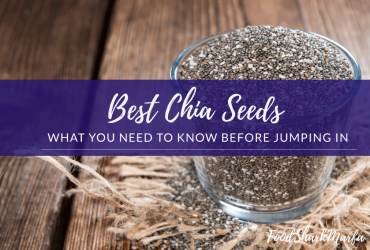
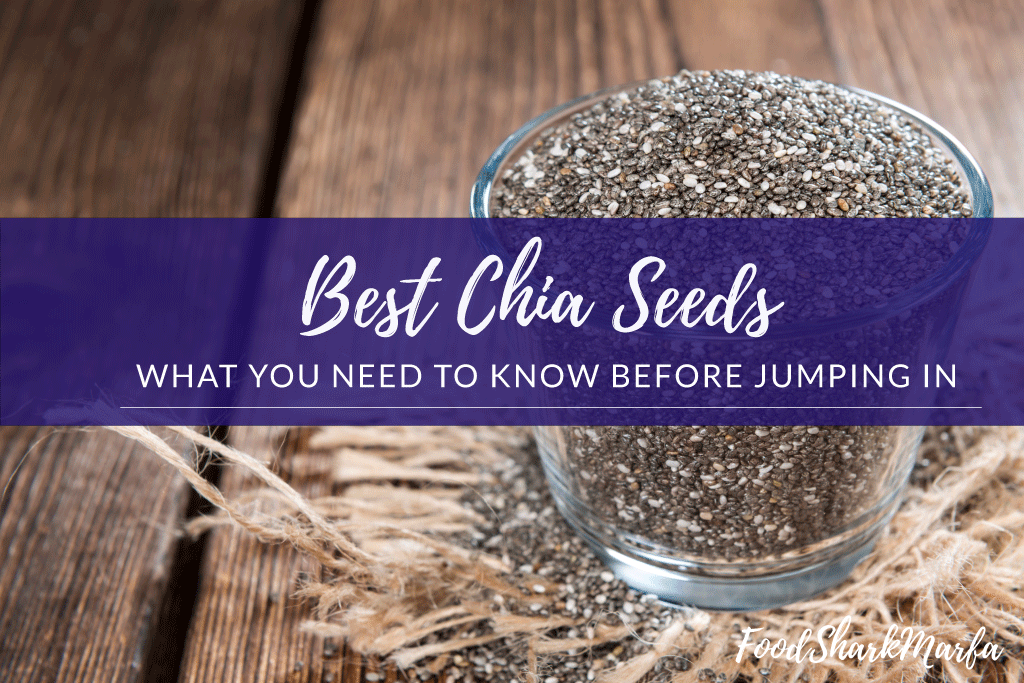
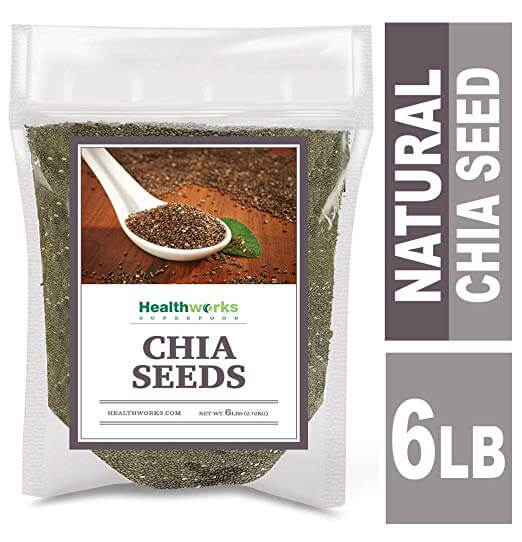
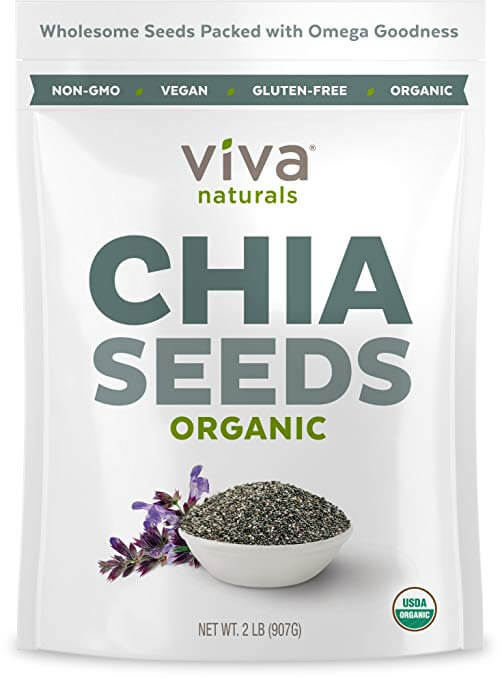
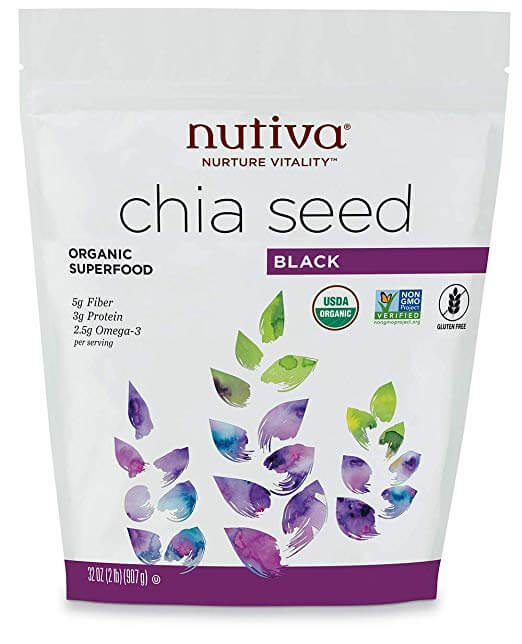
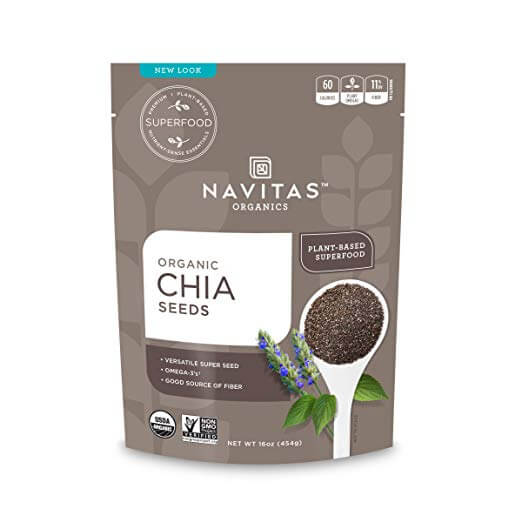
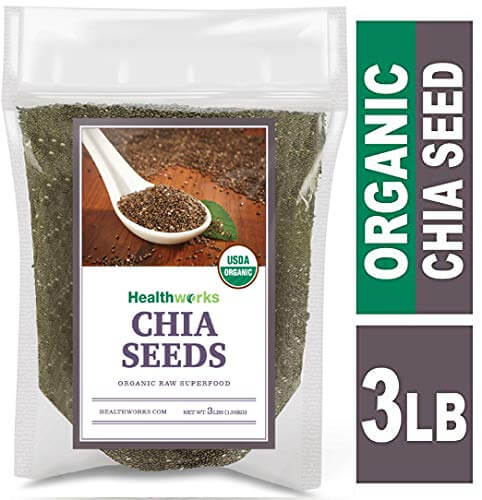
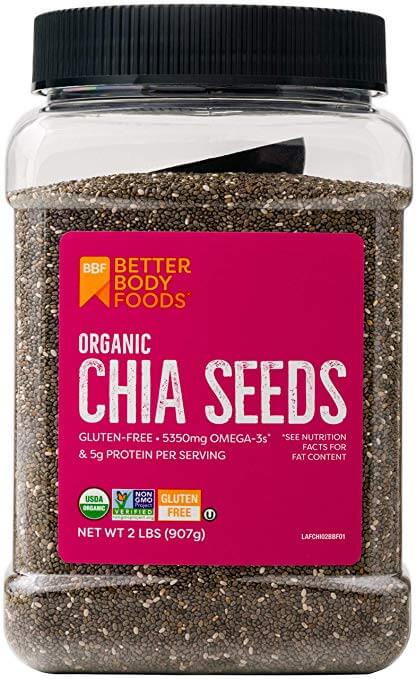
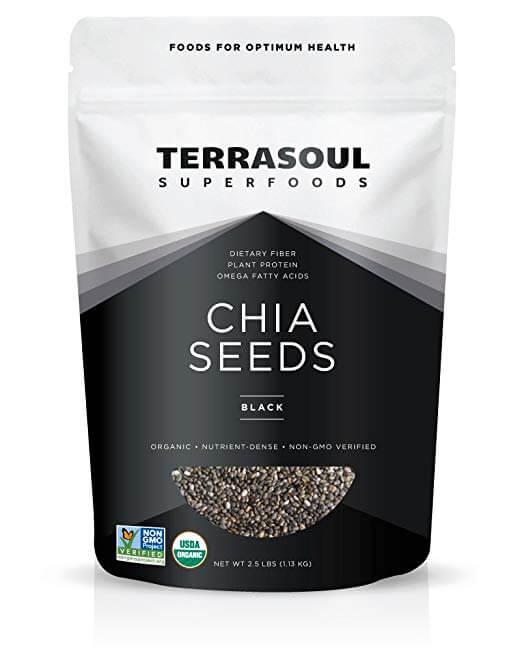
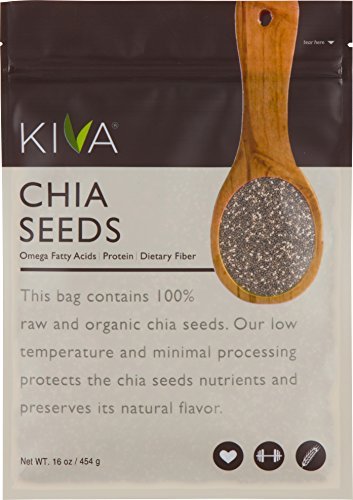
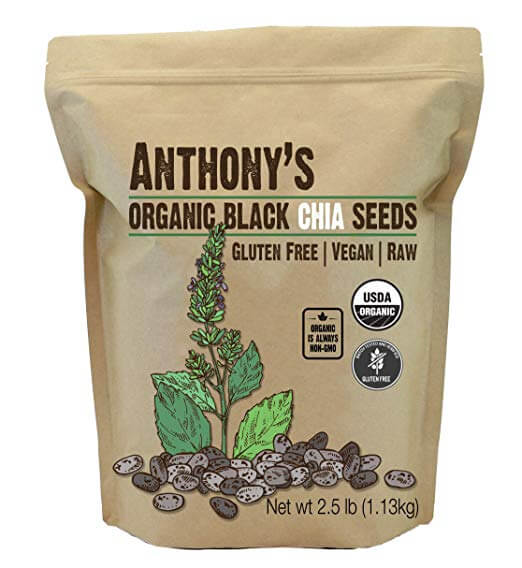
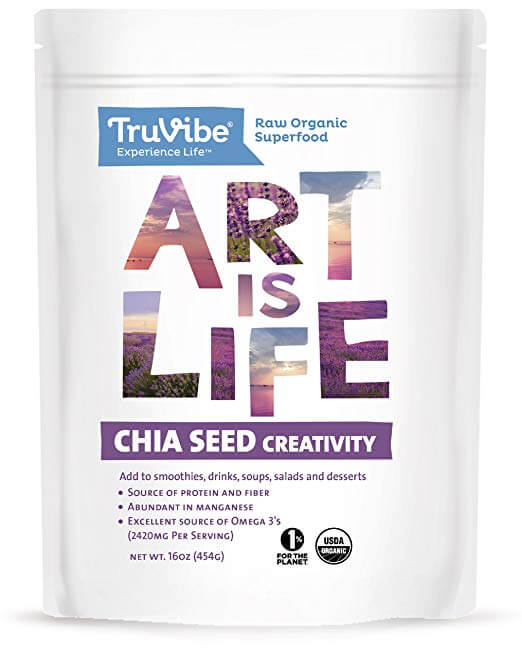

Related Posts
The 10 Best Kitchen Tongs in 2023
The 10 Best Avocado Oils for Cooking in 2023
The 18 Best Fruit Infuser Water Bottles in 2023